Schitt’s Creek star Catherine O’Hara: ‘We’re all delusional’
As the delusional diva in Schitt’s Creek, Catherine O’Hara became the patron saint of lockdown.
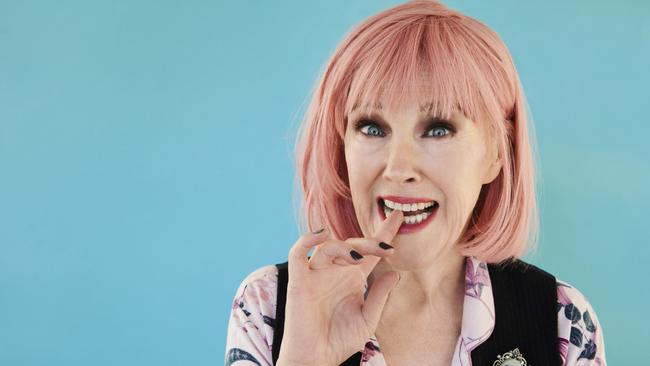
Of all the TV shows that have carried us through the past year, few have been as sweet or as reassuring as Schitt’s Creek. The Canadian comedy series was already a word-of-mouth hit on Netflix before Covid-19 arrived, but assorted lockdowns sent it stratospheric. It follows the (mis)fortunes of the Rose family, a quartet of snooty, spoilt types who, after being defrauded, end up having to relocate penniless to a hamlet in Nowheresville they had bought as a bad joke – the titular Schitt’s Creek. Life lessons, lolz and, most striking of all, deep love ensue.
“I mean – is it wrong to thank the virus for that?” says actress Catherine O’Hara, 67, who has the plum role as the Rose family matriarch Moira, wife to the lightly pompous Johnny and mother to Alexis and David, as they get to know each other again in the confines of an insalubrious motel. Then her very Canadian sense of decency kicks in. “No! That’s terrible!” Terrible but true. O’Hara thinks the show has done particularly well during lockdown because “we were a family who were suddenly stuck together, facing each other day in, day out, and getting to know each other – and in our case, fortunately, we grew to love each other more”. It’s surely what nudged its sixth and final season into winning seven comedy awards at the 2020 Primetime Emmys last September. More specifically, it gave O’Hara the role of a lifetime – and in February this year, her first Golden Globe.
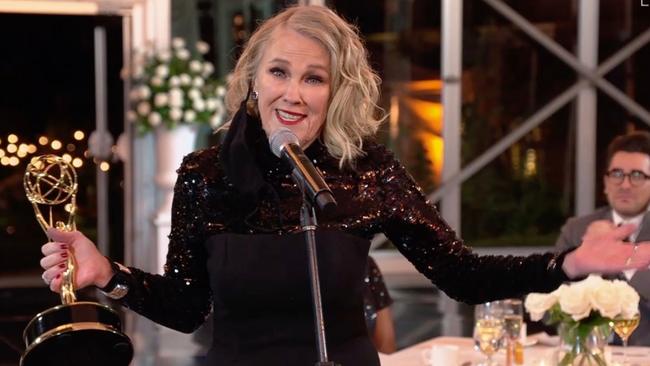
Thanks to Schitt’s Creek, O’Hara, for a long time a familiar face in Hollywood, has finally, properly, become a name. Movie fans will recognise her as the snotty Delia Deetz in Beetlejuice; others will know her as “Kevin’s mom” Kate from the Home Alone films. Comedy aficionados rave about her turns in Christopher “Spinal Tap” Guest’s mockumentaries, such as the dog pageant send-up Best in Show, in which we find her married to the man who plays her husband in Schitt’s Creek, Eugene Levy – a fellow Canadian, friend and collaborator for more than 40 years.
And yet none of her roles has been so universally adored as Moira, a character who takes O’Hara’s avowed penchant for the “insane delusional” and cranks it up 20 gears, thanks to some dazzlingly inappropriate couture, an armada of wigs and an accent that knows no frontiers. “We’re all delusional,” she says. “I love playing people who have no idea what impression they’re making on others.” Although Schitt’s Creek motors on the joys of learning to relish family and community, Moira remains, for all six series, an unrepentant diva who still thinks she can top her glory days as a soap actress by appearing in a desperate-looking horror movie filmed in Bosnia called The Crows Have Eyes.
How Moira is O’Hara, though? The initial answer is, not much. First, there’s the voice. O’Hara says that whenever people recognise her, they “get so disturbed that I don’t sound like Moira – like, ‘What’s that voice? That’s not interesting!” I know what she means. Whereas Moira’s voice is breathy, flutey, sing-song to the point of avant-garde – a melange (according to its creator) of Audrey Hepburn, Marilyn Monroe and Moira’s many exotic travels – O’Hara’s is very gravelly, fast and, well, normal. “When people imitate Moira, they make the mistake of being consistent. I developed a character who was completely inconsistent,” she says gleefully. She did it so she wouldn’t get bored playing her – “so I didn’t have to be the same thing!”
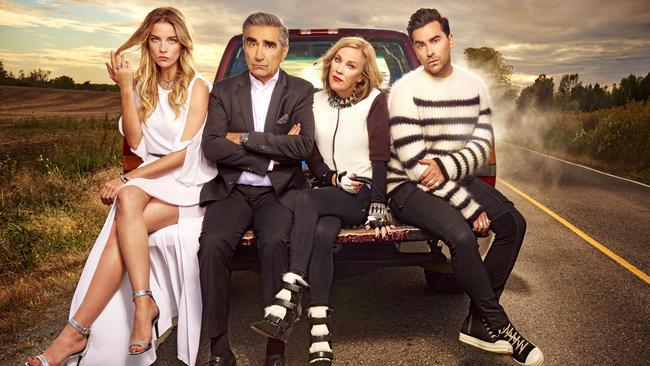
O’Hara doesn’t live like Moira either. The concerns of the warm, chirrupy woman who talks to me over Zoom from an iPad in her kitchen in Los Angeles, where she moved to crack Hollywood in the 1980s, are quite happily domestic. I spy a marble countertop, exposed beams – all very low-key LA – and an open larder door. “Oh, this is my pride and joy!” exclaims O’Hara, wearing sensible, chic glasses and a white blouse, her ash-blonde hair tucked behind her ears. “It’s a shallow pantry!” In the background, Bo Welch, her American husband of nearly 30 years and the father of her two sons, meanders around in a T-shirt.
There is an awful lot we could go over with Schitt’s Creek – its wry wit, its good nature, even its utopian aims. For instance, Moira’s son David falls in love with and marries a local man, but they never encounter any homophobia. Dan Levy, who plays David and co-wrote the show with his father, Eugene, decided he wanted to imagine a world where it simply didn’t exist anymore. O’Hara is all for it and, game collaborator that she is, could spend our entire time together exalting the Levys. “I love to be surrounded by really talented people and just let them rub off on me,” she says. “Their talent, I mean.” And yet she admits that many of Moira’s most distinctive traits – the hairpieces, the voice, the clothes, her bizarre and esoteric vocabulary – were her idea.
Today she happily recalls how Moira’s dramatic look was inspired by a night spent Googling the heiress and fashion muse Daphne Guinness, well known in the society pages for her severe monochrome couture; she explains how she got the idea for all the wigs (at least one per episode) because of not one but two different friends, each of whom would vanish and reappear throughout a soirée with a new hairpiece on. What – between courses? “Kind of … or mid-conversation!”
At first, O’Hara was reluctant to join the cast – she was worried about getting “locked into” the series (and Moira). “Well, if I looked at the show now, of course I’d say, ‘What kind of insane person wouldn’t do it?’ But at the beginning, you don’t know what the show is.”
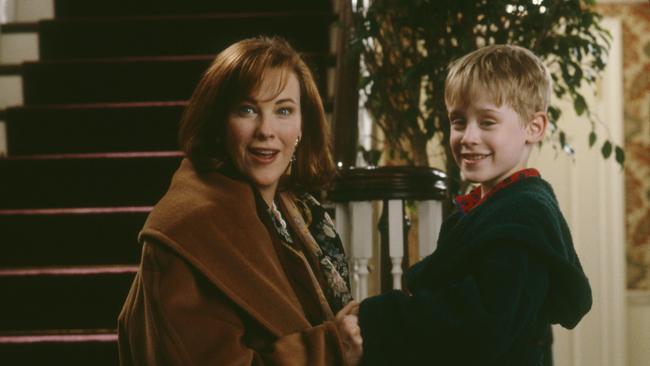
O’Hara was born the sixth of seven children in a boisterous clan in Toronto; her family are Irish Catholic on both sides. In them you can see where her funny bones come from, and also the strength she has always seemed to have to trust her own path. I read a profile of her from 1986, when she had known a first burst of stardom appearing in the Canadian sketch series SCTV (again with Levy – they won an Emmy for writing it back in 1982), which quotes a colleague saying: “I don’t think Catherine is ambitious in the sense that her career is important to her.” Um, really?
“Yes!” she mouths with a slight apology. “I come from a large family and everybody is wonderful, and we all made each other laugh at home, so it’s not like I was desperate to go out and get laughs from somebody else, from strangers.”
At the dinner table every night in Toronto, O’Hara’s mother, a housewife, “would tell stories of people she met that day, and imitate the people, and my dad [who worked for Canadian Pacific Railway for 45 years] would tell straight-out jokes that he heard from the office. So it was two very different styles of comedy, but both I’ve been tapping ever since.” Her parents are now deceased, but “they laughed, God bless them, to the very end of their lives. They would laugh at things that would just break others. And also, when they were younger, it was the sexy thing about them – watching them make each other laugh.”
It was via these home dinners that O’Hara got her break, since one of her older brothers was dating the future comedy great Gilda Radner (one of the founding cast of Saturday Night Live). Through Radner, O’Hara would get a job as a waitress at Toronto’s prestigious Second City theatre, which would lead to her joining the troupe. Second City would soon reach the screen as SCTV, a Canadian rival to Saturday Night Live. There she met Levy, who was already a member, and he championed her immediately. “All the way along he’s been my acting guardian angel,” she sighs. I remind her they also dated for a nanosecond: she revealed this once in an interview and never hears the end of it. “I’m terrible for telling that,” she tut-tuts playfully. “Thankfully, it went nowhere.” Thankfully? “Yeah, romance-wise, because I don’t think we would have this relationship.”
After a few supporting roles in the mid-1980s, in films such as Martin Scorsese’s After Hours and the Nora Ephron-scripted Heartburn, playing second fiddle to Meryl Streep, she went on to do Beetlejuice (1988) and Home Alone (1990) and has worked solidly in Hollywood since, coming out apparently unscathed – although she did find herself typecast. “I was thinking the other day, I’ve been a mother to about 100 kids,” she says brightly. “Jack Black, Luke Wilson, Colin Hanks, Macaulay Culkin… Jared Leto!” Was she frustrated by this? “It really depends on how it’s written,” she says. “What other position in life is as important? Why would you say, ‘Oh, I don’t want to play the mother, that’s nothing!’”
I wonder if O’Hara had any other ambitions. Last year, a Vanity Fair profile described her as “an actor who spent decades getting passed over for romantic leading roles”. Was there ever a hope she’d be the next Meg Ryan? “Uhhhh, if somebody was thinking of me that way, they didn’t tell me!” she says. She tells a story about having lunch with a New York writer-director, whom she won’t name, about a potential leading role in a romcom. “He said to me: ‘You’re great! I’m looking for your kind of woman. You know – somebody who’s pretty enough, but anybody can have you.’” What did she say to that? “Why, thank you so much!” she mugs. “I mean, I didn’t get mad or anything. That was just kind of, Oh! Oh… OK.” She shrugs it off defiantly. “Either I wasn’t pretty enough, or he knew nobody could have me. I didn’t get the role.”
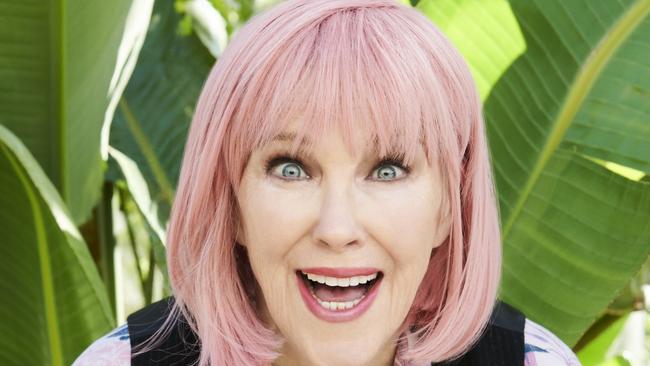
As we’ve been chatting, her husband, Welch, has been pottering around in the background. O’Hara fondly repeats the story of how the Beetlejuice director, Tim Burton, set them up. “I’d say to Tim, ‘The production designer is talking to me all the time, but he never asked me out!’ And he said, ‘Let me see what I can do.’” They were in their mid-30s when they got together. Before meeting Welch, “I made a lot of poor dating choices,” she says. “Thankfully, my Catholicism stopped things before it got bad.” I’m not sure if O’Hara is telling me she was a virgin before marriage, but it sounds as if she aimed to be saintly. “Is there anyone in your world that you regret not sleeping with?” she cries. “I ask people this all the time – very few of them can come up with a name. So I’ll thank my faith for that.”
Marriage was important to her. She’d worked solidly in her 20s doing SCTV and left it at the age of 30 in 1984 “because it hit me… I realised I had nothing else going – my life was my work”. So she became “not obsessed with getting married, but just: I think that’s also my job in life, just to try and take care of that”. She says she and Welch treat each other as equals, and “he makes me laugh – and he laughs at some of the things I say. To me, that’s sexy.” Then the self-deprecation kicks in: “But let’s be honest, we’ve been through our ups and downs, so I don’t mean to make some kind of fairytale here.”
Their sons Matthew and Luke are in their mid‑20s and both have followed in Welch’s footsteps, with Matthew doing construction on sets and Luke doing set-dressing. I congratulate her on not subjecting them to the horror of being actors. “I swear either one of them could do it if they chose – they’re really funny,” she beams. “You know, they’re around showbusiness, but we’re not really into it at home.” She prioritised bringing them up; if you’re going to bring children into the world, then “we’re lucky, and we should be with them”, she says simply.
What next? It’s clear she’ll wait and select the right thing, but she also knows she should finally write something herself. “I love writing, and I do have, I think, a few really good ideas,” she says, “but I guess I need a deadline. But then I don’t want to make a deal with anyone! I’d rather work on spec. But yeah,” she says quietly, “I think if I don’t do that soon, I will have at least one regret.”
Though she hates to be “locked in”, you sense Moira is still there somewhere. In fact, the white blouse she wears today is, she admits, Moira’s. Would our patron saint of lockdown ever come back? Just as she’s about to switch off Zoom, O’Hara suggests she might. “We should do a movie! That would be nice. Fingers crossed!” Only a few months ago, Daniel Levy said the idea of a film was far away for now, to give the characters time to rest. But O’Hara seems to think differently. And surely it’s clear by now that she knows best?

To join the conversation, please log in. Don't have an account? Register
Join the conversation, you are commenting as Logout